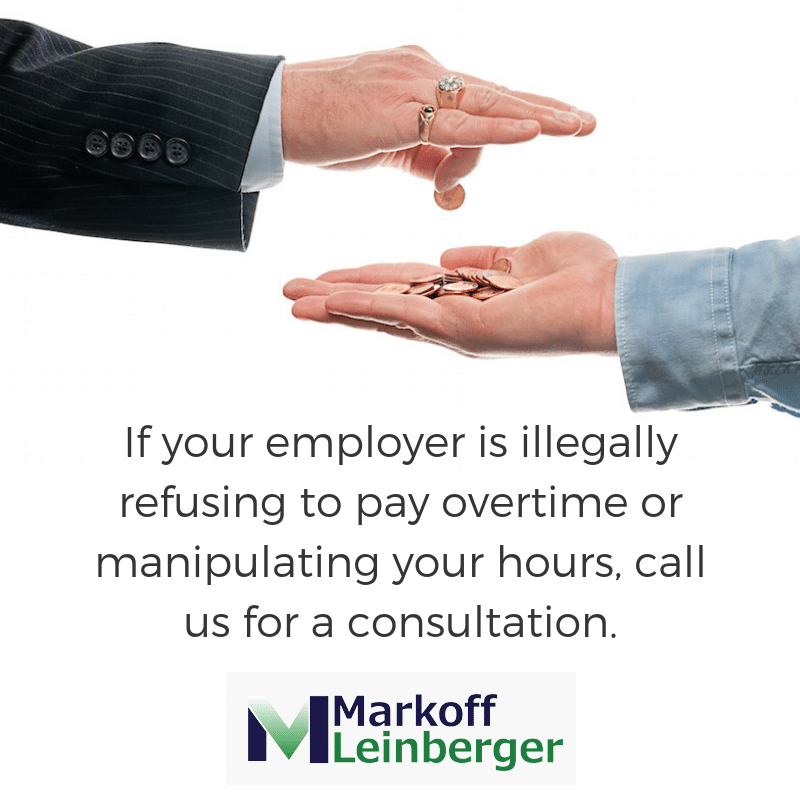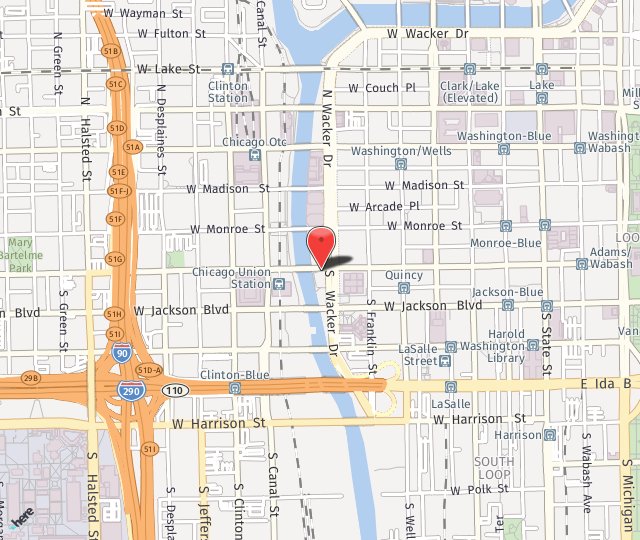CONSUMER RIGHTS LAW FIRM SERVING CLIENTS IN CHICAGO, ILLINOIS, AND NATIONWIDE
There are various federal and state laws which regulate the payment of overtime wages to qualifying employees. Under the Fair Labor Standards Act (FLSA) and Illinois Wage Payment and Collection Act, non-exempt employees are entitled to receive overtime wages (1.5 times your normal wage) for any hours worked over the standard 40 hours per week. Hours spent in meetings, preparing for work, and completing any tasks required for the job may be considered when determining if you are eligible for overtime.
Some employers will categorize employees incorrectly, labeling them managers or executives, in order to avoid paying overtime. This and similar practices are considered wage theft in the eyes of the law.
If you believe you have been unfairly denied overtime pay, the Chicago overtime violations lawyers at Markoff Leinberger can make sure your rights are protected. To find out if you have a valid case, please call 312-726-4162 today to schedule a free consultation.
Can You Be Denied Overtime?
Your employer can deny your request to work overtime. Working overtime may go against company policy. In some cases, the number of overtime hours that employees can work in a week may be limited even if overtime work is allowed. These practices are completely legal.
However, you cannot be denied overtime pay. If you work over 40 hours in a week and are eligible for overtime, your employer must pay you at the time and a half rate. If you were denied proper compensation, you may be able to file a lawsuit to recover back pay and other damages.
Can an Employer Get In Trouble for Not Paying Overtime?
There are penalties in place for not paying overtime. Employers who fail to compensate their workers for overtime may owe employee back wages, damages, and legal fees. Additional penalties may be appropriate based on state laws and the details of the specific FLSA violation.
Repeated or deliberate violations often come with heftier consequences. For employers who consistently disregard FLSA requirements, criminal penalties may even be at stake.
How Do Employers Avoid Paying Overtime?
Employers know that it is illegal not to pay overtime. That is why they have come up with tricks and tactics to get their employees to work more without getting compensated properly. Some of the different ways that employers avoid paying overtime include:
- Misclassifying employees
- Falsifying time records
- Requiring employees to work off the clock
- Failing to pay time and a half
- Failing to pay for time spent traveling to a work-related destination or errand
- Paying employees in cash to “work off the books”
- Averaging the hours worked
- Providing compensatory (“comp”) time instead of overtime
Common Violations Of The Fair Labor Standards Act (FLSA)
One common violation of the FLSA occurs when an employer classifies you as a manager when your job duties are those of a non-exempt employee.
In some instances, employers may try to avoid paying overtime to salaried employees. However, not all salaried employees are exempt from receiving overtime wages. If you are on salary but do not perform managerial duties, you may be entitled to overtime. Other common violations include failing to pay for all hours worked, falsifying time records to avoid paying overtime, failing to pay "time and a half" for overtime, and measuring overtime eligibility over more than a week (e.g., if you are paid every two weeks, you must be paid for overtime if you work more than 40 hours in a week, even if you work fewer than 80 hours over the two week span.
Common Violations Of The Illinois Wage Payment And Collection Act
Employers must pay employees their full compensation for the regular pay period (and no later than 13 days after the pay was earned), even after termination. Employers cannot "stall." Employers must also provide pay stubs to employees.
What Happens if an Employee Works Unauthorized Overtime?
It is common for business owners to prohibit or discourage overtime work. After all, overtime pay adds up quickly, and it can easily cut into the company's bottom line. However, if employees work overtime anyway, they must be compensated at the time and a half rate.
It is illegal not to pay employees for overtime — authorized or not. You cannot be denied overtime pay that you are legally entitled to receive. However, employees who repeatedly break company policies that prohibit unauthorized overtime may be penalized or terminated.
What Is the Statute of Limitations for OT Violations?
Generally, a two-year statute of limitations applies to the recovery of back pay. That means unpaid overtime can be collected up to two years from the date earned. If your employer knowingly and willingly violated the FLSA, you may have an additional year to recover wages.
Missing this window to file your employment law claim means losing your only opportunity to recover compensation. Contact our lawyers immediately to ensure your rights are protected.
How Our Employment Law Attorneys Can Help

If our overtime violations lawyers determine that you were unfairly denied overtime, we will fight aggressively to ensure you receive the wages to which you are entitled. Please contact Markoff Leinberger today by calling 312-726-4162 or completing our online form to schedule your free consultation. Our lawyers serve clients in Chicago, Illinois, the Midwest, and nationwide.
Client Review
"This review and has been long overdue. Karl Leinberger & Staff has been exceptionally accommodating to any of my questions and needs. Everything was handled with such professionalism and on a timely manner. He kept me well aware of my case and made sure I had clear clarity. Thank you for all your hard work and commitment through my time of despair. I would highly recommend your firm to others who find themselves in my situation Keep up the good work!"
How to prepare for your case in court
Many wage and hour violation cases are settled before they reach court. Sometimes, they can be resolved through an administrative claim with the state’s labor department. However, if your unpaid overtime case does go to trial, our attorneys will make sure that you are prepared.
Some potential steps that you may need to take include:
- Reading the complaint
- Finding a copy of your employment contract
- Gathering documents and evidence for trial
- Practicing your presentation and preparing notes
What Kind of Compensation or Resolution Should I Expect?
In a successful overtime lawsuit, you should expect to recover the wages that your employer failed to pay. That would include the overtime premium that you did not receive initially. You may also be entitled to an award of interest on the unpaid overtime wages or liquidated damages.
In some cases, your employer may have to pay you double the unpaid wage amount. Certain penalties may also result in additional compensation depending on the details of the case. Finally, these successful verdicts and settlements usually include attorney and court fees.


